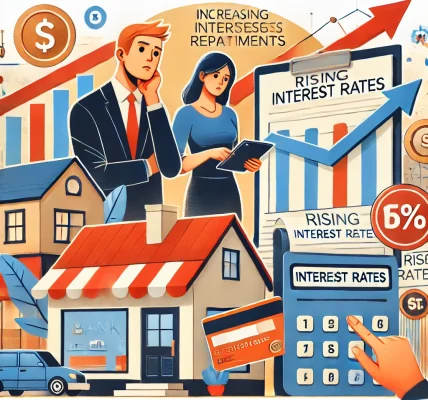The rise of Financial Technology, or FinTech, has revolutionized the way we interact with money, shaping the future of finance and reshaping global economies. From online payment systems to blockchain technology, FinTech has disrupted traditional financial services, offering more efficient, accessible, and inclusive solutions. For investors, this transformation presents both opportunities and challenges that require careful consideration. In this blog, we will explore how FinTech is changing the global economic landscape and what it means for investors in the new era of finance.
1. What is FinTech and How Does It Work?
FinTech refers to any technology used to improve or automate financial services. It covers a wide range of innovations that improve how we manage money, conduct transactions, invest, and plan for the future. Some of the key components of FinTech include:
- Digital Payments & Wallets: Services like PayPal, Venmo, and digital wallets (e.g., Apple Pay, Google Pay) have made it easier and faster to send and receive money, creating a cashless economy.
- Blockchain & Cryptocurrencies: Blockchain technology enables secure and transparent transactions, with cryptocurrencies like Bitcoin and Ethereum leading the charge in decentralized finance.
- Robo-Advisors & Investment Platforms: Automated platforms like Betterment and Wealthfront offer low-cost, efficient investment strategies to individuals, democratizing access to investment services.
- Peer-to-Peer Lending: FinTech has opened the door for individuals and businesses to borrow money directly from lenders, bypassing traditional banks.
FinTech works by leveraging technologies like artificial intelligence (AI), big data, machine learning, and blockchain to provide faster, cheaper, and more secure financial services.
Key Takeaway: FinTech is transforming traditional financial systems by offering innovative, more efficient alternatives to managing money, investing, and borrowing.
2. How is FinTech Transforming Global Economies?
The impact of FinTech is felt globally, affecting individuals, businesses, and entire economies. Here are the key ways that FinTech is driving economic transformation:
A. Financial Inclusion for the Unbanked
One of the most significant contributions of FinTech is increasing financial inclusion. According to the World Bank, nearly 1.7 billion adults remain unbanked, meaning they have no access to traditional financial services. FinTech has changed that by providing access to financial products and services through smartphones and the internet.
- Mobile Banking: Services like M-Pesa in Kenya allow people without a traditional bank account to send money, receive payments, and save digitally, helping to bridge the gap between the banked and unbanked populations.
- Microloans: Platforms like Kiva and Funding Circle enable individuals in developing countries to access microloans, helping entrepreneurs build businesses and improve their communities.
By providing access to capital, savings, and financial education, FinTech is creating new economic opportunities in emerging markets and supporting entrepreneurship.
B. Improving Efficiency in Global Payments
Global payments have long been cumbersome, expensive, and slow. Traditional banking systems involve multiple intermediaries and often charge high fees for cross-border transactions. FinTech is solving these problems by offering cheaper, faster, and more efficient alternatives.
- Blockchain & Cryptocurrency: Cryptocurrencies like Bitcoin and Ethereum allow for near-instantaneous and low-cost international transfers without the need for intermediaries. Blockchain’s decentralized nature also increases transparency and reduces fraud.
- Cross-Border Payments: Companies like TransferWise (now Wise) offer low-cost cross-border transfers, making it easier for individuals and businesses to send money globally at a fraction of the cost of traditional banks.
This efficiency reduces transaction costs for businesses, boosts international trade, and accelerates economic activity worldwide.
C. Boosting Investment and Economic Growth
FinTech has democratized investment opportunities, making it easier for individuals to participate in the global economy. From stock trading to real estate investing, FinTech platforms offer access to a wide range of investment opportunities previously reserved for wealthy individuals or institutional investors.
- Robo-Advisors: Automated platforms like Betterment and Wealthfront use algorithms to create diversified portfolios based on individual risk tolerance, making it easier for people to invest with minimal effort and cost.
- Crowdfunding & Crowdinvesting: Platforms like Kickstarter and SeedInvest enable businesses to raise capital from the crowd, accelerating innovation and economic growth. Investors can back projects that align with their values while earning returns on successful ventures.
These innovations not only allow individuals to diversify their portfolios but also enable businesses to access funding more easily, fostering job creation and overall economic growth.
D. Transforming the Banking Sector
The rise of FinTech is forcing traditional financial institutions to innovate and adapt. Banks are increasingly adopting FinTech solutions to improve customer experience, reduce costs, and enhance efficiency.
- Open Banking: Open banking initiatives, which allow third-party developers to access banking data (with permission), are creating more customized and user-friendly financial services.
- AI-Powered Banking: Artificial intelligence is being used to enhance fraud detection, improve customer service (e.g., chatbots), and create personalized financial advice.
As traditional banks integrate FinTech into their operations, the entire financial system becomes more agile, responsive, and inclusive.
3. Opportunities for Investors in the FinTech Sector
The rapid growth of FinTech presents a wealth of investment opportunities, with new startups and established companies driving innovation across the financial services industry. Here are some ways investors can capitalize on the FinTech boom:
A. Investing in FinTech Startups
FinTech startups are leading the charge in disrupting traditional financial systems. Many of these companies are backed by venture capital and offer exciting growth potential for investors.
- Angel Investing & Venture Capital: For those with a higher risk tolerance, investing in early-stage FinTech startups can yield significant returns if the company succeeds.
- Equity Crowdfunding: Platforms like SeedInvest and Crowdcube allow individual investors to buy shares in early-stage FinTech companies, diversifying investment portfolios.
B. FinTech Stocks and ETFs
For more risk-averse investors, publicly traded FinTech companies provide an opportunity to invest in the sector. Companies like Square, PayPal, and Shopify have become major players in the digital payments and e-commerce space.
- Exchange-Traded Funds (ETFs): ETFs that focus on FinTech companies, like the Global X FinTech ETF, allow investors to diversify their holdings across a range of FinTech firms, reducing individual company risk while tapping into the sector’s growth potential.
C. Cryptocurrencies and Blockchain Investments
Cryptocurrencies and blockchain technology have become a major part of the FinTech revolution, attracting investors looking for high-risk, high-reward opportunities.
- Cryptocurrency Investment: Directly investing in cryptocurrencies like Bitcoin, Ethereum, or newer altcoins offers significant profit potential, but also carries substantial risk.
- Blockchain Technology Companies: Investing in companies that are developing blockchain technology or providing related services can also be lucrative as blockchain adoption grows in sectors beyond finance, such as healthcare, logistics, and supply chain.
4. Risks and Challenges in the FinTech Space
While FinTech offers tremendous potential, it’s not without its risks. As an investor, it’s important to be aware of the challenges:
- Regulatory Uncertainty: FinTech companies often operate in a regulatory gray area. Changes in government policies, such as stricter regulations on cryptocurrencies or mobile banking, can significantly impact the industry.
- Cybersecurity Threats: As FinTech platforms handle sensitive financial data, they are prime targets for cyberattacks, which can undermine trust and lead to financial losses.
- Market Volatility: The rapidly changing nature of the FinTech sector means that some startups may fail, and the value of certain investments can fluctuate widely.
Key Takeaway: Investors should be aware of the risks in the FinTech sector but also understand the growth potential. Diversifying investments and staying informed about industry trends can help mitigate these risks.
5. Conclusion: Embracing the Future of Finance
FinTech is more than just a passing trend—it’s a transformative force that is reshaping global economies. By driving financial inclusion, improving efficiency, and creating new investment opportunities, FinTech is opening up the global economy in ways never seen before. As an investor, staying ahead of these trends and understanding the potential of FinTech can lead to substantial opportunities.




